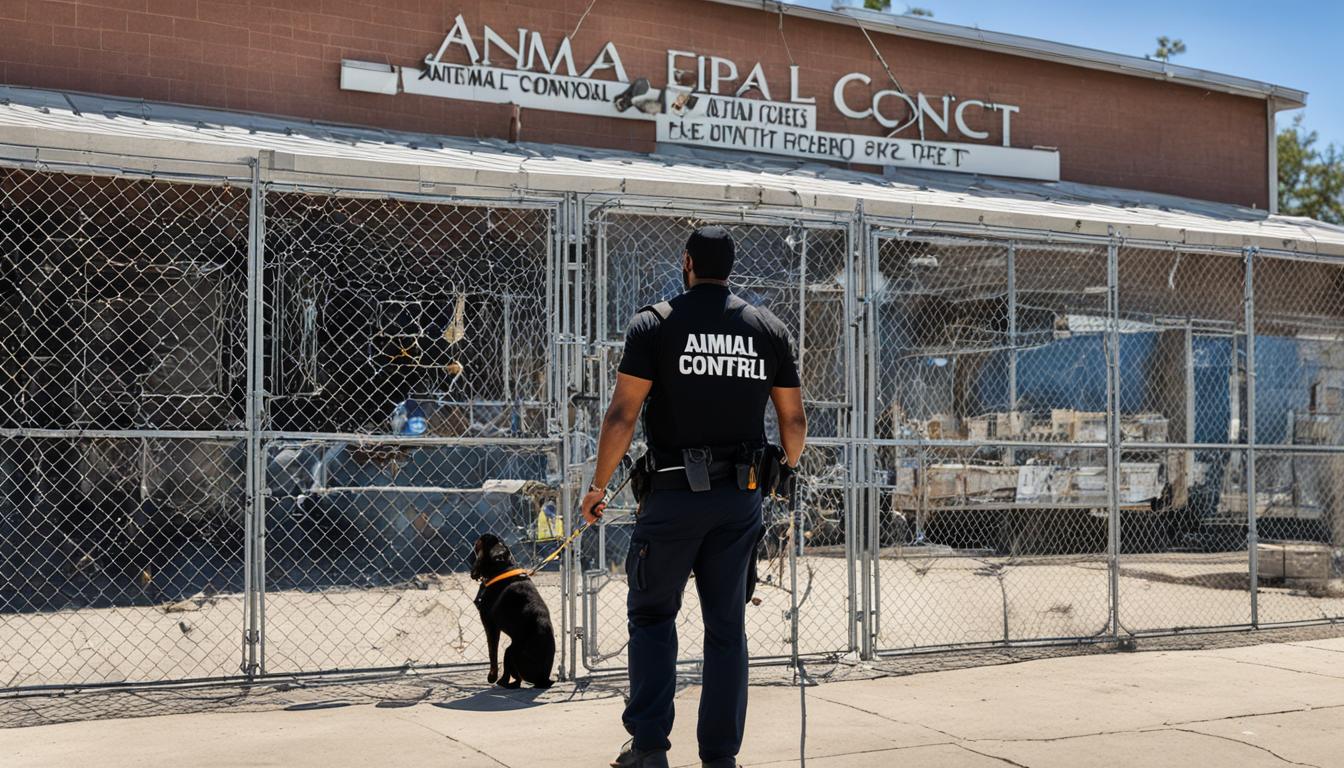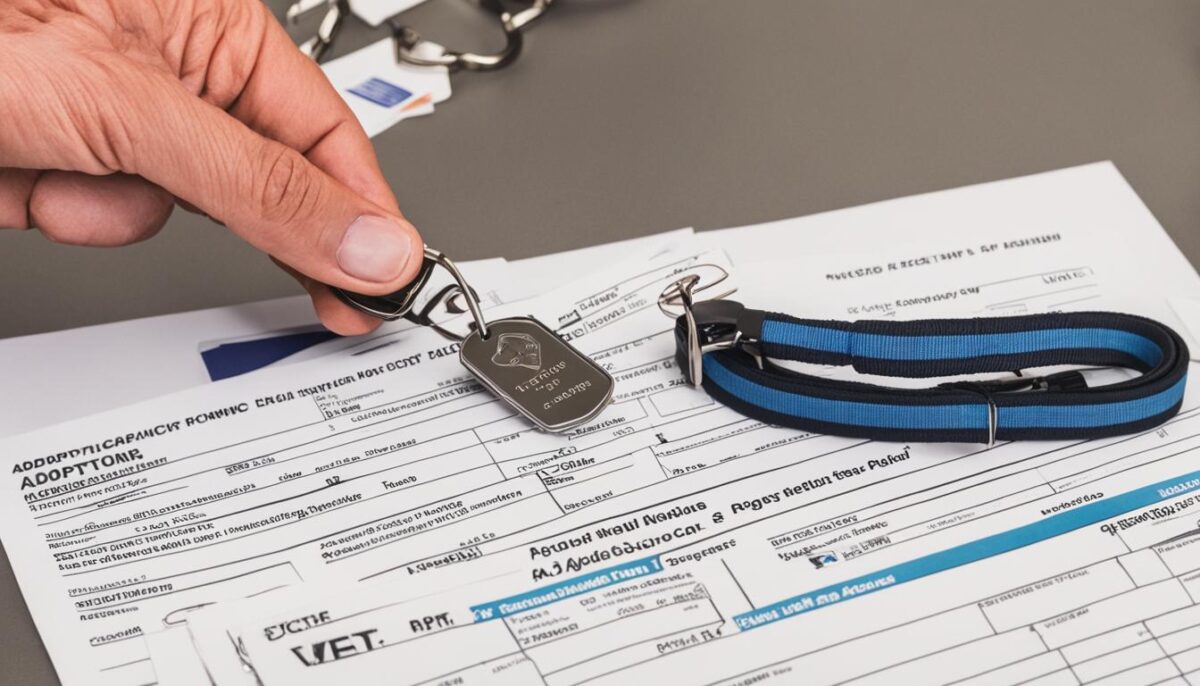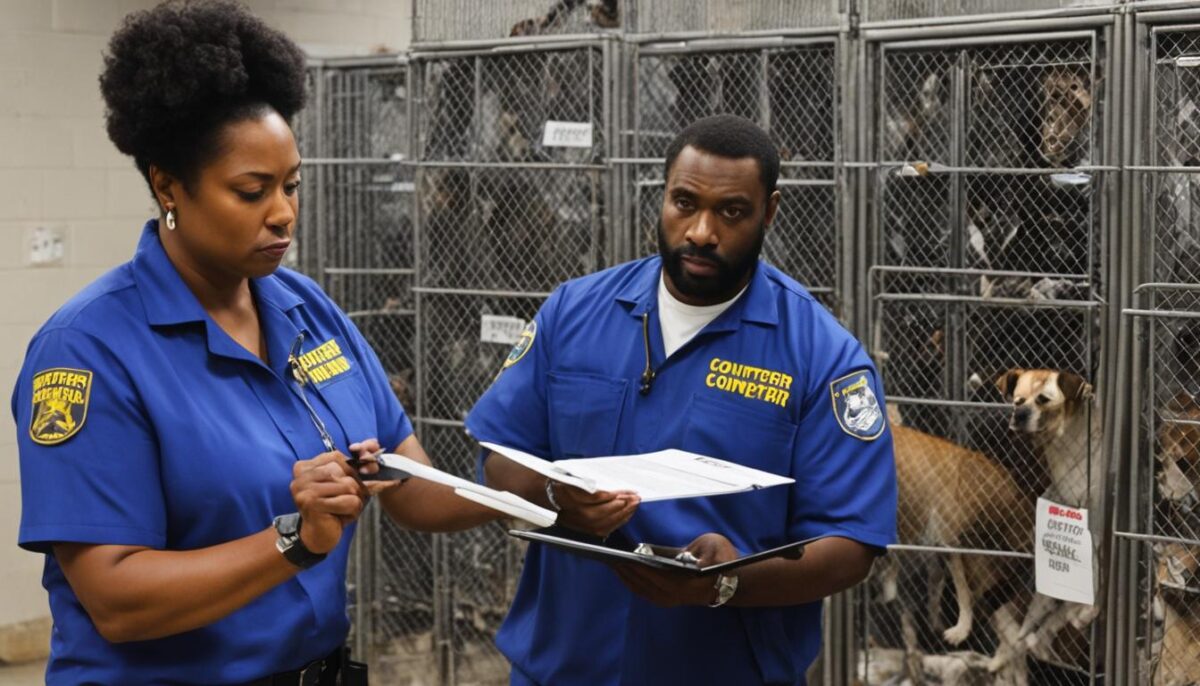Picture this: Your dog, your furry friend, is not in the yard. You check everywhere, but they’re gone. You’re worried, of course. But did you know there’s hope? Yes, you can get your dog back from an animal shelter. If your buddy has a tag or a chip, the shelter will keep them safe for a while. They wait for you to find them.
If your dog doesn’t have those, you might need to act faster. A shelter will wait, but not as long. It could be just 72 hours in some places. There are rules for getting dogs back. Knowing these rules can make it easier to see your dog again. But you need to hurry. As each day goes by, it gets harder to secure your dog’s return.
Luckily, with a bit of know-how, the animal control reclaim process is something you can handle. So take a deep breath, let’s get ready to bring your pal home. It’s all about the steps you take right now.
Key Takeaways
- Find out about the shelter’s rules for a lost dog.
- Check if your dog has a tag or a microchip.
- Know the time you have to get your dog back.
- Learn what to do to retrieve your pet from an animal shelter.
- Getting your dog back is easier for tagged or microchipped pets.
- You need to act fast for the best chance to secure your dog’s return.
Understanding Animal Control Laws and Your Rights as a Pet Owner
When you welcome a dog into your home, it becomes more than just a pet—it’s a part of your family. But what happens if your furry friend gets lost? It’s important for you to know about animal control regulations and your rights. The laws might seem tricky, but once you understand them, you’ll be equipped to reunite with your pup should they ever stray.
The Legal Status of Animals in the United States
In the U.S., our four-legged pals are usually seen as property. That might sound a little cold, but it’s good news for you because it means that legally, your dog is still yours even if they go on an unexpected adventure. However, our pets are getting more rights now, and some laws treat them as the family members they are, not just property.
Ownership and Title Rights
Did you know that in some states, if your pet gets hurt by someone else, you could be entitled to receive money for their treatment? This is because the law often protects animals just as it would protect your other belongings. The changes in pet ownership laws reflect how much we value our pets.
State Specific Holding Periods for Animal Control
It’s crucial to know how long animal shelters are required to care for your lost pooch before they can say it’s theirs. This time varies from state to state and is known as the state holding period. Let’s take a peek at some of the differences across the country:
| State | Minimum Holding Period | Microchipped Pets | Tagged Pets |
|---|---|---|---|
| California | 4 days | Additional 2 days | Additional 2 days |
| New York | 5 days | Same as minimum | Same as minimum |
| Texas | 3 days | Additional 1 day | Additional 1 day |
Understanding animal rights and animal control regulations will help safeguard the bond you share with your pet. By staying informed, you can ensure that if your dog does make a dash for freedom, you’ll be ready to bring them back where they belong—home with you.
Identifying Your Dog: Licensing, Tags, and Microchips
Imagine if your dog got lost. You would want to find them fast, right? Well, there is something you can do to help your dog come home. It’s called getting your dog a license and some ID, like a tag and a microchip. Let’s dig into why these are super important for your furry buddy.
The Importance of Licensing Your Pet
When you get your dog a license, it’s like giving them a special doggy driver’s license. It shows who your dog belongs to and where they live. If your dog is lost, the license can help them come back to you. Pet licensing benefits are great because they can save your dog from staying away too long and help you avoid big fees.
How Identification Aids in the Recovery of Lost Dogs
Dogs love to run and play, and sometimes they wander off. But if they have a tag or a microchip, it makes finding them so much easier. Think of a tag as your dog’s name tag. It tells people your dog’s name and where they live. A microchip is even better. It’s a tiny chip that a vet puts under your dog’s skin. It can tell animal helpers your phone number. That way, they can call you if someone finds your dog. With dog identification tags and microchipping advantages, your playful pal has a way better chance of coming home if they go on an unexpected adventure.
- Licensing proves your dog is yours and meets local dog rules.
- Tags are easy to see and tell people your dog isn’t a stray.
- Microchips can be checked by shelters to call you right away.
Did you know that microchipping has helped lots of lost pets find their way home? It’s really true! This is why it’s so great for lost pet recovery.
Look at this table to see why each ID for your dog is super useful:
| Kind Of ID | What It Does | How It Helps |
|---|---|---|
| License | Shows your dog is registered in your city. | Animal control can easily find where they live and who loves them. |
| Tag | Has your dog’s name and your phone number. | Anyone who sees your lost dog can call you to help them get home. |
| Microchip | A tiny chip a vet puts under the dog’s skin. | Shelters can scan the chip to find your contact info and call you. |
So, always make sure your dog wears their tag, and think about getting a microchip too. This way, your doggy friend can always come back to you. It’s one of the best ways to keep your dog safe!
Act Quickly: Steps to Take Immediately After Your Dog is Impounded
When your dog is taken by animal control, it’s very important to act fast. Do you know what to do first? You need to find and call the animal control agency where your dog might be. You also must show that you are the owner with the right papers. Here’s a guide to help you through this process.
Contacting the Right Animal Control Agency
To find your dog, you need to call the place that takes care of lost pets. This might be an animal shelter or animal control. Find the one that works in the area where you last saw your dog. They are the people who can help you find your dog.
Documenting Proof of Ownership
Proving that you own your pet is a must. You might be asked for different kinds of papers. Here is a list of things you can use to show you are the owner:
- Vet Records – Shows when your dog saw a doctor.
- License Papers – Proves your dog is registered with your city.
- Photos – Good ones that clearly show you and your dog together.
These papers need to have your name and info on them. They should also have your dog’s details. This helps the shelter see that your dog belongs to you.
| Document Type | Why It Helps | Where to Get It |
|---|---|---|
| Vet Records | Shows your dog’s health history and your name as the owner. | Your pet’s vet clinic. |
| License Papers | Proves that you have registered your pet with official agencies. | Local city or county offices. |
| Photos with Dog | Helps to visually prove your relationship with your pet. | Your personal photo collection. |
If you do these things quickly, you have a better chance of getting your dog back home soon. Make sure to contact animal control and show them your proof. This is the best way to help your furry friend!
What to Expect When You Visit Animal Control to Retrieve Your Dog
Going to the animal shelter to reclaim your dog? Here’s a heads-up on what will happen. You’ll have to prove that your four-legged friend is yours and deal with some paperwork and costs. Be sure to check what the shelter needs from you before you go.
Procedures and Paperwork to Prepare For
At the shelter, expect some animal shelter procedures. You’ll be asked to fill out pet retrieval paperwork. Be sure to bring proof that you’re the owner like photos or vet records. If your dog was picked up by the shelter, they’ve been taking care of them, so getting them back involves some steps.
Reclaiming Fees and Possible Fines
Sometimes you might need to pay fees for dog reclaiming. If your dog didn’t have a tag or license, you could also face a fine. These costs might get higher the longer your dog has been at the shelter. Always have your ID with you, as they will ask for it.
| Reason for Fee or Fine | Cost |
|---|---|
| Reclaiming Fee | $(amount) |
| Licensing Fine (if applicable) | $(amount) |
| Daily Care Fee | $(amount) per day |
| Unlicensed Dog Fine | $(amount) |
How Can I Get My Dog Back from Animal Control
Is your dog at an animal shelter? Don’t worry! You can get them back. Here are the steps to reclaim a lost dog and make sure you secure your pet’s return from the shelter. First, find out how long the shelter keeps pets before they might give them away or put them down. This is sometimes only three days!
Next, make sure your pet has a license and wears tags. This helps to avoid extra costs and makes it much easier to get your dog back. Remember to act quickly! As soon as you know your dog is lost, call the shelter. This way, you have a better chance to bring your furry friend back home.
- Check local laws about animal shelters and how long they hold lost pets.
- Ensure your pet is licensed and has up-to-date tags.
- Call the animal shelter right away if your pet goes missing.
If you go through these steps, you’ll be on your way to dog retrieval from animal control. Keep reading to find out more on how you can keep your best friend safe!
| Before Shelter Visit | At the Shelter | After the Visit |
|---|---|---|
| Know the hold period for lost pets | Provide identification and proof of ownership | Update pet’s license and tags |
| Have your pet licensed | Prepare to pay any fees or fines | Keep pet tags visible |
| Contact shelter immediately | Confirm all information with shelter staff | Take preventive steps to safeguard your pet |
Navigating Legalities: Ownership Challenges and Disputes
Let’s talk about what happens when two people think they both own the same dog. This can be tough but don’t worry, you can sort things out. Sometimes, to get your dog back, you might need to show you are the real owner. It’s like detective work but for doggy care.
When the Original Owner is Contested
If someone else says, “That’s my dog,” it can be confusing. To clear things up, think about who has been feeding the dog, taking it to the vet, or buying it toys. The court might ask about these things to see who the dog should live with.
Dealing with Potential Legal Challenges
If you find yourself in a bit of a tangle over who your dog’s human is, it might help to ask someone who knows the rules. Lawyers can give you advice on how to prove your pooch is yours. They know all about Ownership dispute resolution, challenging pet ownership, and can also offer legal advice for pet reclamation.
If you’ve done everything you can to find your lost dog and keep records of it, these will be super helpful. Keep all your dog’s ‘found’ posters and any messages you sent out looking for them. It shows the court your heart belongs to your dog and you’re trying your best to bring them home.
Remember, your love and care for your furry friend are super important. Whether you’re caught in a mix-up about who owns your dog or just trying to show you’re the best human for your pet, be patient and keep a cool head!
Conclusion
If your beloved dog ends up at animal control, it’s definitely a situation that can make you worried. But remember, if you know what to do, you can have a successful pet retrieval. Make sure to understand the rules, know your rights as a pet owner, and don’t wait to take action. Keep your dog’s ID tags and microchip up-to-date so they can tell it’s your pet.
Start searching for your pet as fast as you can if they get lost. This quick action is important and will help bring your dog back to you. When it’s time for finalizing dog reclaim from shelter, have your documents ready to show you’re the owner. Taking these steps will make everything go smoother.
In the end, with patience and the right approach, you and your furry buddy can have a happy reunion with your pet. Just imagine the tail wags and happy dances when you two meet again. That happy moment is worth all the effort. So keep your chin up, and get ready to welcome your pet back into your arms!
FAQ
How can I retrieve my pet from an animal shelter?
To retrieve your pet from an animal shelter, quickly contact the animal control agency responsible for the area where your dog was last seen. Provide proof of ownership, like veterinary records or license documents, and be prepared to pay any associated reclaiming fees or fines.
What are my rights as a pet owner regarding animal control?
As a pet owner, your rights include the legal status of owning your animal. In the U.S., pets are considered property, meaning you retain ownership even if they run away. Be aware of local animal control regulations and state-specific holding periods for impounded animals.
Why is it important to have a license or a microchip for my dog?
Licensing or microchipping your dog vastly improves the chances of recovery if they get lost. These forms of identification help shelters and animal control agencies quickly return your pet to you and may also protect you from higher fines or reclaiming fees.
What should I do immediately after my dog is impounded?
Act quickly after your dog is impounded by contacting the correct animal control agency and providing them with your dog’s identification details. Also, gather any documentation that proves you’re the owner of your pet to facilitate the reclaim process.
What procedures and paperwork should I prepare for when visiting animal control to get my dog back?
When visiting animal control to reclaim your dog, prepare for procedures such as filling out claim forms and providing valid identification for yourself. You’ll also need paperwork that proves your ownership of the dog, such as licenses, registration, or vaccination records.
How much will it cost to get my dog back from animal control?
The cost to get your dog back from animal control can include various fees, such as daily boarding costs, vaccination or medical treatment fees, and possible fines for not complying with local pet licensing or leash laws. These costs can vary by jurisdiction, so it’s essential to inquire about specific fees when you contact the shelter.
What if someone else claims they own my dog?
If someone else claims ownership of your dog, you may need to provide evidence of your care and ownership, like vet bills or purchase records. The situation could lead to a legal dispute, in which case, having thorough documentation and possibly legal advice might be required.
What are the consequences if I don’t try to find the original owner of a dog I found?
If you find a dog and don’t make a reasonable effort to find the original owner, you may be in violation of local laws. Most jurisdictions have regulations that specify the actions a finder must take, such as reporting the found dog to animal control or taking steps to locate the owner before assuming ownership.
Is there a standard holding period before animal control can put a dog up for adoption?
The holding period before a dog can be put up for adoption by animal control varies by state and sometimes by local jurisdiction. Generally, this period can range from 72 hours to longer, and it is intended to give owners a chance to reclaim their pets before they are made available for adoption or, in some cases, euthanized.
Can a shelter claim ownership of my pet if they are unclaimed for a certain period?
Yes, if a pet is unclaimed for a specific period as defined by local laws, the shelter may legally claim ownership and have the right to rehome the pet. It is essential to act fast and keep your pet’s identification updated to avoid such situations.


